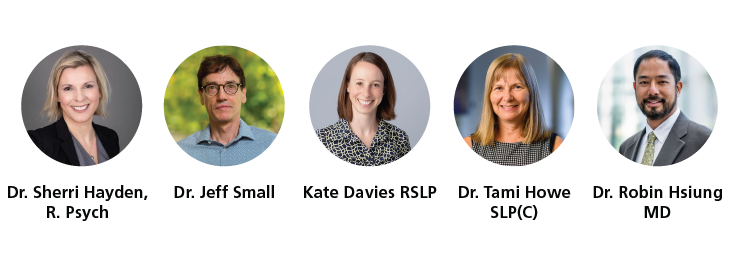Webinars: Unlocking the power of communication
Our webinars aim to address communication challenges presented by dementia, offering education and insights to enhance the quality of life for people living with dementia and their caregivers.

Last updated: December 7, 2023.
Communication is a fundamental aspect of human connection – but when dementia enters the equation, communication can become profoundly challenging. Throughout November, the Alzheimer Society of B.C. is hosting webinars exploring the relationship between dementia and communication, discussing topics including frontotemporal dementia and primary progressive aphasia.
The Alzheimer Society of B.C. has invited a community of experts who will be leading the webinars, bringing in knowledge and experience and providing valuable insights on communicating with people living with dementia.
“The community members will hear from the subject matter experts from the field, understand about different types of dementia, comprehend the challenges and changes people with dementia experience, and equip them with communication strategies tailored to the specific needs and abilities of those living with the disease,” says Lori Kelly, Provincial Coordinator, Program Operations at the Alzheimer Society of B.C.
Click on the link below to watch our on-demand webinars:
- Understanding frontotemporal dementia, featuring Dr. Sherri Hayden, R. Psych
Learn what Frontotemporal dementia is, how it’s diagnosed and how it differs from other types of dementia in symptoms and progression. - Speech language pathologists and communication care
In this video, guest presenters Dr. Jeff Small, Kate Davies and Dr. Tami Howe discuss how dementia can affect a person's communication, explore the role of speech-language pathologists in dementia care and how they can support communication changes related to dementia. Avenues of accessing speech-language pathologists are also provided. - Understanding and adapting to communication changes along the dementia journey
A person’s ability to communicate will change over the course of the dementia journey. Learn how different types of dementia affect communication and discuss strategies for adapting to and coping with these changes. - Primary progressive aphasia and supporting communication, featuring Kate Davies RSLP and Dr. Robin Hsiung MD
This webinar provides an overview of primary progressive aphasia, how speech, language, and communication can be affected by primary progressive aphasia, and how speech-language pathologists can support those living with primary progressive aphasia and their family members.
About the guest speakers

Dr. Sherri Hayden, R. Psych
Dr. Hayden is a Clinical Neuropsychologist and Clinical Assistant Professor with the Division of Neurology, Department of Medicine at the University of British Columbia. She is also a faculty member of the University of British Columbia Women’s Health Research Cluster.
Over the past 30 years, Dr. Hayden has worked at UBC Hospital in the Clinic for Alzheimer’s Disease & Related Disorders as well as in her private practice at the NeuroHealth Clinic. Dr. Hayden’s clinical practices serve a variety of populations including neurodegenerative disorders, traumatic brain injuries, post-chemotherapy cognitive issues, post-COVID cognitive issues, and mental health related cognitive issues. Dr. Hayden applies preventative and lifestyle medicine principles to her clinical practice.
Dr. Jeff Small
Dr. Jeff Small is a Professor in the School of Audiology and Speech Sciences at the University of British Columbia. He is also a Researcher in the Centre for Research on Personhood in Dementia (at UBC), an interdisciplinary team of practice-based and applied researchers who are committed to improving understanding and support for people living with dementia, their families and communities.
Dr. Small’s research investigates how persons with dementia and their care partners may benefit from using memory and communication strategies in their everyday interactions. He and his collaborators have created and implemented communication enhancement training programs for caregivers in both institutional and family care settings. The goal of this training is to help caregivers understand and use evidence-based strategies when supporting persons who experience cognitive, language, and/or behavioural challenges.
Kate Davies RSLP
Katharine Davies is a PhD candidate in the School of Audiology and Speech Sciences at the University of British Columbia and a registered speech-language pathologist. Before starting her PhD, Katharine completed a BA in International Relations, MA in Linguistics, and a MSc in Speech-Language Pathology. Her research focuses on understanding the communication needs and concerns of people living with primary progressive aphasia and their family members.
Dr. Tami Howe SLP(C)
Tami Howe, PhD, is an associate professor in the School of Audiology and Speech Sciences at the University of British Columbia. Prior to obtaining her PhD, Tami worked for several years as a speech-language pathologist with adults with communication disorders in Canada and New Zealand. Tami’s research focuses on exploring how we can enhance the everyday lives of adults living with communication disorders caused by dementia or stroke.
Dr. Robin Hsiung MD
Dr. Hsiung is Associate Professor in the Division of Neurology, Department of Medicine, University of British Columbia, and staff neurologist at the UBC Hospital Clinic for Alzheimer and Related Disorders and St. Paul’s Hospital. His research interests include Clinical and Genetic Epidemiology of Alzheimer Disease and related neurodegenerative dementias, neuropsychological characteristics of cognitive disorders, imaging and biomarkers of dementia, as well as translational research on neurological health and aging.
